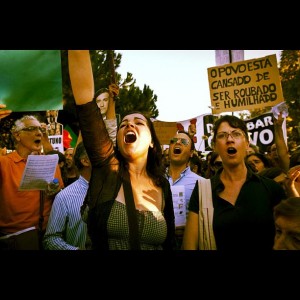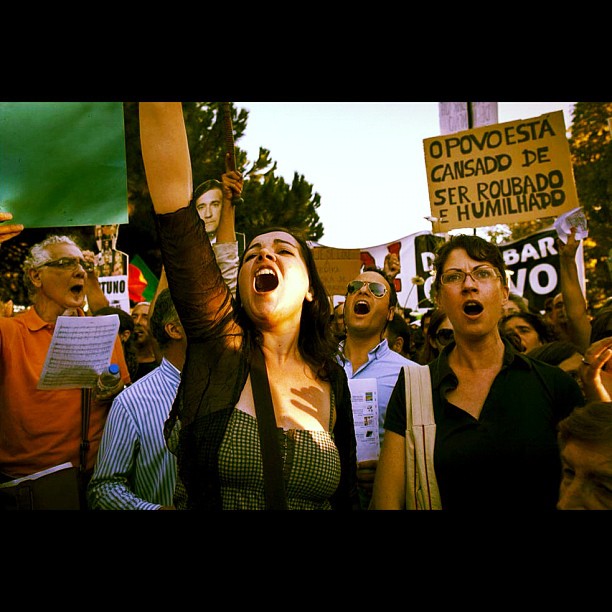This piece appears in Mint-Lounge today.
Last October, as Portugal’s President Anibal Cavaco Silva addressed his recession-battered compatriots on their country’s republic day, he was interrupted by a beautiful song. It floated across the 18th-century courtyard in which the event was being held, sending the President’s bodyguards into a state of confusion. They decided to shuffle Cavaco Silva off to safety. It was the start of Ana Maria Pinto’s career as Portugal’s most melodious public protestor.
With the TV cameras and press photographers swarming around her, the 32-year-old opera singer, wearing a black top and a red backpack, defiantly belted out an aria. In a nation lacerated by cuts to social-security schemes, Pinto’s ballad struck a chord. It seemed to articulate the belief of millions of Portuguese citizens that the austerity programme designed to revive their economy was actually making life more difficult, especially for the aged and the poor.
 Since the much-hated troika—the European Commission, the European Central Bank and the International Monetary Fund—forced Portugal’s government to tighten its belt in May 2011, prices and taxes have soared. So has the unemployment rate, which stands at almost 17%. Wages, though, have fallen, so low in some sectors that call-centre jobs from India are being relocated to Portugal. “We feel betrayed,” Pinto said. “The government made false promises. There are no conditions in Portugal now to support a life. If you lose a job, you have to migrate. Everything is being privatized and these enterprises don’t follow moral principles—their point is only to make money for themselves.”
Since the much-hated troika—the European Commission, the European Central Bank and the International Monetary Fund—forced Portugal’s government to tighten its belt in May 2011, prices and taxes have soared. So has the unemployment rate, which stands at almost 17%. Wages, though, have fallen, so low in some sectors that call-centre jobs from India are being relocated to Portugal. “We feel betrayed,” Pinto said. “The government made false promises. There are no conditions in Portugal now to support a life. If you lose a job, you have to migrate. Everything is being privatized and these enterprises don’t follow moral principles—their point is only to make money for themselves.”
It isn’t common for classical musicians to insert themselves into the heart of political movements, but Pinto came to her new role after a great deal of reading and reflection. When the Portuguese economic crisis erupted in 2010, two years after the implosion of leading US financial institutions, Pinto was making a comfortable living in Berlin, a city with a vibrant opera scene. After months of tracking the troubles from afar, the soprano decided to return home. “I felt I needed to do something,” she explained. “I also wanted to be connected to my people: that’s what feeds your soul.”
At a rally in September last year, Pinto was deeply moved to realize that the thousands of strangers around her shared her anxieties about the mess in which Portugal was embroiled. She was also stirred by a placard held aloft by a friend. “Acordai,” it said—Wake Up. It was a call to action with a resonant history: Acordai is the title of a ballad composed by Fernando Lopes-Graça, a spirited opponent of the dictatorship that ruled Portugal for 42 years, until 1974. “I immediately thought I’d like to sing it at a demonstration,” Pinto said. Shortly after, she created a Facebook event, explaining what art and revolution meant to her, and asking her countrymen to join her in a square in Lisbon to sing the anthem. Five hundred people showed up. The Acordai movement was underway.
Read the complete piece here.


